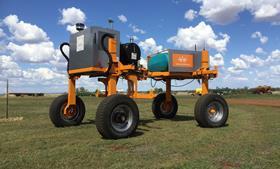
Australian technology start-up SwarmFarm Robotics has launched its robot technology for use in cropping, which will improve productivity, lower costs and reduce environmental impacts.
The launch on 22 March included a multi-robot demonstration of spot-spraying weeds at a farm in Emerald, central Queensland.
“The robots are adjustable in height, with a simple design, that can be used on a variety of crops from tree crops and vegetables to sugar cane, cotton and broad acre crops,” Andrew Bate told Produce Plus. “They’re more like a tool carrier, and can be used for weed spraying and spot-spraying.”
Bate said one of the major issues affecting growers in Australia at the moment is herbicide-resistant weeds. So, Bate and his partner Jocie began developing solutions with universities, eventually partnering with the University of Sydney’s Australian Centre for Field Robotics and the Queensland University of Technology to develop the robotic technology.
“We’re not trying to automate farming, but we want to create better farming techniques to improve yields and efficiencies,” Bate said. “These robots have the ability to move slowly, with high-level precision, and perform repetitive tasks with precision. They’re also light-weight, which reduces soil compaction.”
SwarmFarm Robotics has also announced its partnership with agri-firm Elders, which Bate said has been a fantastic boost for the early stage start-up to go commercial.
“This technology may prove to be the next big thing for our cropping clients, so we want to be involved from an early stage,” Elders national technical services manager Graham Page said. “For Elders, the development of robotics has huge implications for agronomy so our partnership with SwarmFarm Robotics will enable us to take an early lead in understanding how this technology works and how we can help our clients apply it.”
In the initial stages, SwarmFarm Robotics will focus on the central Queensland region, working with growers to use the technology on tree crops like citrus and macadamia trees, as well as vineyards and cotton.
Bates added that in coming years they’ll be looking at developing the technology further, expanding the capabilities of the robot technology to plant, fertilise and manipulate crops.






No comments yet